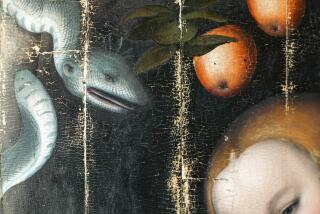Research Challenges Artists’ Efforts to Depict Bible Scenes Accurately
NEW YORK — Remember, from childhood, those colored scenes of the bearded Moses leading his people through the desert, the muscular Samson breaking those pagan temple pillars, the boy David facing the giant?
These are among the pictorial biblical dramas portrayed in lesson materials for youngsters in church classes, and they leave mental images that sometimes remain key clues to the content.
But they’ve sometimes also been a bit wrong.
That’s what staffers in the art department of the Southern Baptist Sunday School board in Nashville, Tenn., have discovered in their efforts to make those pictures historically and biblically accurate.
Stepping up that endeavor in the last six years, art personnel have expanded their research, visiting museums in London, Berlin and throughout the United States, and also making trips to biblical sites in the Holy Land.
The artists and designers have accumulated a collection of more than 1,900 photos and slides, as guides to ensure accuracy in their representations.
They call it the “million-dollar file,” but art department director Jerry Ross puts its worth at more than that.
But it’s a big, complicated job, still going on. “We realized after it took three years to complete research for six Bible stories that this was a long-term project,” Ross says.
Since the Sunday School Board is the main publishing arm of the 14.6 million-member denomination, putting out about 600 million pieces of literature annually, its art department has a pivotal role in the illustrations.
Ross says some of the research leads “to images different from those we grew up with,” such as traditional portrayals of Jesus in a full-length white robe.
“People have taken the concept of the risen Christ in a flowing white robe and applied that to his whole life,” Ross says.
However, he says that research, and the dusty soil of the Holy Land, indicate that Jesus did not wear a robe that dragged the ground.
Other details, such as his traditionally shown shoulder-length hair, also don’t square with research, he says, noting this sometimes produces a struggle over whether to adhere to familiar tradition or the findings.
However, Bill Latta, supervisor of the youth-adult curriculum design section, says, “We don’t just draw what we think. We rely on what the research shows.”
Credibility is a key factor, he says. “The art needs to be consistent with the biblical text and historical facts.”
For example, he cites one previous teaching picture with a Roman battering ram in an Old Testament setting, long before Roman times.
“Few people would notice that, but we need to be as accurate and consistent as possible,” he says.
Paula Savage, an artist-designer who handles art for Biblical Illustrator magazine, likens the research to the gradual unraveling of a mystery.
“Once you get started on it, you find more things to investigate,” she says. Finding answers to some questions, she notes, often opens up further questions still to be probed.
A 10-volume cross-reference index describing thousands of photos from the research provides a ready tool for illustrators in checking details for Bible scenes.
Additional descriptive material and historical data is provided in another 15 volumes of research documentation.
More to Read
Sign up for Essential California
The most important California stories and recommendations in your inbox every morning.
You may occasionally receive promotional content from the Los Angeles Times.










